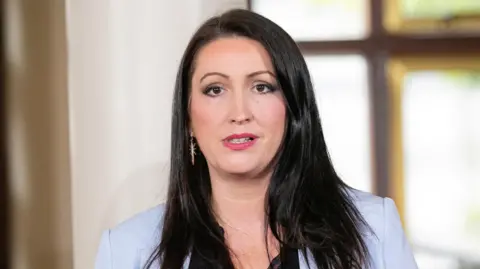Stormont co-options remove democratic choice - report
 Gareth Chaney/PA
Gareth Chaney/PANorthern Ireland's system of replacing Stormont assembly members and councillors who step down removes democratic choice and reduces transparency, an Electoral Commission report has said.
Under the co-option process, political parties can fill vacancies in the Northern Ireland Assembly and in local councils without holding a by-election.
One in 10 members of the legislative assembly (MLAs) have been co-opted since the last Stormont election in May 2022.
And 24 councillors (about 5%) have been co-opted since May 2023 when the last local government election was held.
The elections use the Single Transferable Vote system, in which voters rank candidates in order of preference and several are elected to represent each constituency.
In its report, the Electoral Commission said the co-option process was in place "to ensure the preference of electors at the previous election continues to be reflected".
But co-option "removes democratic choice from voters".
"This issue is likely to be exacerbated in 2027 when both the assembly and local government elections are scheduled to take place," it added.
The watchdog said a "substitution list" provided by candidates at the time of nomination might be one possible solution.
Stormont's most high-profile co-optees include Deputy First Minister Emma Little-Pengelly.
She was selected by the Democratic Unionist Party (DUP) to take up former party leader Sir Jeffrey Donaldson's seat days after his election to Stormont in 2022.
He was MP for Lagan Valley and the rules do not allow MLAs to hold more than one role.
UK general election
Following the UK general election in July, four sitting MLAs and a councillor were elected to Westminster.
They were Traditional Unionist Voice (TUV) leader Jim Allister; the Alliance Party's Sorcha Eastwood; former Health Minister Robin Swann of the Ulster Unionist Party (UUP); independent unionist Alex Easton; and Sinn Féin's Cathal Mallaghan.
They had to resign their elected positions to become MPs due to rules against double-jobbing.
Their parties chose their replacements, while Easton picked the DUP's Peter Martin to take up his assembly seat.
The Stormont vacancies were filled by councillors, creating another four vacancies to be filled in local councils.
Cahir Hughes, head of the Electoral Commission in Northern Ireland, said there had been an "increased use of co-option in recent years, both at assembly and council level".
"Ahead of the 2027 elections, the Electoral Commission will engage with the UK government and political parties to maintain integrity and confidence in the electoral process in Northern Ireland," he added.
Candidate abuse 'more prevalent'
The Electoral Commission report on elections this year also examined voter confidence and the experiences of candidates.
It said 55% of respondents from across the UK felt they had some issues with harassment, intimidation or abuse during the general election.
This included 13% who felt they had a serious problem with abuse.
Of voters surveyed, 85% in Northern Ireland expressed confidence elections were being well run, and were satisfied with registration and voting.
Mr Hughes said: "The issue of candidate intimidation and abuse is growing more prevalent in our society which must be tackled."
